
English Folk Music
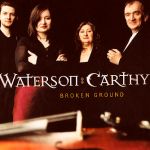
|
|
English Folk Music |

|
Updated: December 15, 2007
There is a lot of English folk music, but my tastes to date favor only a small sample of it, and much of that comes from the northern edge of England, particularly the area of Northumbria on the border of Scotland. TNorma Waterson, Martin Carthy, and their daughter Eliza sing traditional English songs with a strong Celtic flavor to them. Kathryn Tickell plays the bagpipes, but English bagpipes. And Jez Lowe is just an exceptional songwriter. Here are the albums I am enjoying now:
 |
Eliza Carthy -- in a few short
years, Eliza has gone from being the precocious child of British folk legends
Martin Carthy and Norma Waterson, to being a tremendous force in English
traditional music scene. A great, dark singing voice, a ferocious ability on
fiddle, and a strong commitment to revive traditional English music have been
Eliza's trademarks. I first stumbled onto the force that is Eliza in her 1997 album, Eliza Carthy and the Kings of Calicutt (Topic Records, Ltd). In its review, Dirty Linen magazine commented that Eliza is "way too young to be this good." With a very hot band backing her up, this is a very exciting album. This was clearly one of the great albums of 1997, outranking Bob Dylan's grammy award winning release in many reviewers' minds. |
|
|
Which brings me to Eliza's 1998 double CD -- Red Rice (Topic Records). Eliza shocked at least me again, not only with her fire engine red hair and lip stud, but with this double CD set. It would be hard to imagine two CDs more different being packaged together. As before, the liner notes do nothing more than name the tunes and musicians. I wager this will be one of the more talked about CDs of the year. |
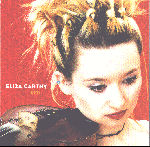 (Red ) |
Be forewarned, Red takes traditional English tunes and four of Eliza's own compositions and sets some of them in very modern, aggressive, jazzy/rock arrangements with electric guitars, electric bass, piano accordion, lots of drums, and very heavily programmed synthesizers firing off like jackhammers or doing etherial washes while Eliza is fiddling away. This is shocking stuff for ears used to acoustic music, and I needed a day's readjustment of attitude before approaching this album again. On second go around, the music and arrangements were still very bold, a new generation speaking in its own idiom--and with awesome skill and self-confidence. Eliza's musical knowledge and command of the material is obvious, and I find her arrangements, however radical, to be intelligent and not the least contrived, in contrast to much celtic rock. I have come to like this CD a lot, and have great respect for Eliza's ability to pull it off. |
 (Rice) |
In contrast, the second CD of the set, Rice, is entirely traditional arrangements, although some songs reflect a personal interpretation. Eliza sings and fiddles old northern English tunes with only melodeon and acoustic guitar backing (and a wee bit of clogging thrown in for good measure). Musically, this is where Eliza is coming from. Eliza's very dark and powerful voice is riveting, and her fiddling aggressive and effective as ever. Rice infuses extraordinary vigor, energy, and relevance into this traditional English music. With this 2 CD set, Eliza has come with a statement. I think of
traditional music as people familiar with, and respectful of, a tradition,
speakng musically to each other with passion and honesty about their lives and
concerns. Eliza is speaking eloquently, and you had better listen. At last count, Eliza plays on the various CDs: fiddle, viola,
tenor guitar, one row button accordion, and I saw her a nice job on a set of
Leicestershire bagpipes. Scary! |
 |
Waterson:Carthy consists of Martin Carthy, Norma Waterson and their daughter Eliza Carthy. Martin and Norma are legends of English folk music. Eliza comes by her genius honestly. I started with their second CD : Common Tongue (Topic Records, 1997) This is a fine album Wonderful, dark, harmony singing, terrific songs, and then the extraordinary fiery fiddling of Eliza. |
|
 |
-
Broken Ground (1999 Topic Records) is even better. The
trio is joined by Saul Rose on melodeon and backing vocals. Rose's melodeon
playing adds a new and wonderful sound to three great singers and the always
very strong fiddling of Eliza. There are wonderful solos and great harmony
singing, plus some beautiful hornpipes and reels played as instrumentals, and a
great a capella version of "The Ditchling Carol". Mention must be made of the
terrific English songs that Liza has found. This album has it all. Between this
family and Kate Rusby, English traditional music has found terrific champions.
(Very highly recommended) - A Dark Light (Topic Records, 2002). The first family of English folk is back with another excellent CD. This album of 11 songs is even darker in mood. Martin Carthy, Norma and Eliza Waterson and Tim Van Eyken alternate in being lead vocals, with the three combining in haunting harmonies several tunes, particularly on a fine version of "Shepherd's Arise". Van Eyken also adds some lovely punchy melodeon rythym to some hornpipes. (Highly recommended)
|
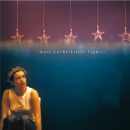
|
Kate Rusby -- .
Hailed by BBC Radio 2 as 'One of the Top Ten Folk Voices of the Century', Kate
is the only folk performer to earn Britain's prestigious Mercury Prize, has won
Irish Music magazine's coveted Best Female Folk Artist for several years
running, is multiple winner of the BBC's Folk Artist and Album of the Year awards
and had her praises sung by everyone who has heard her, including Richard
Thompson, who raved, ' …a wonderful traditional singer. Really, really
fantastic."
Sleepless (Pure Records 1999) is the CD that really catapulted her to critical acclaim and popular awareness. Rusby has a quiet, low-key style of singing in contrast to the in-your-face singing of Eliza Carthy. The album consists of 6 traditional, but little-known, English songs, four songs written by Rusby that sound traditional, and Iris Dement's "Hometown". The songs generally involve unrequited love or memories or earlier times sung with lovely expressiveness by Rusby. Rusby's accompaniment by Ian Carr, Michael McGoldrick and others is generally understated and beautifully arranged. On three tunes, there are some lovely duets. This album has no celtic flavor, being entirely folk. Rusby is also featured on the Poozies' excellent album, Infinite Blue. Little Lights (2001
Compass Records). How does one follow up on the phenomenal Sleepless? Well, Kate
gives us more of the same, this time with more (5) of her own songs, plus 1
Richard Thompson song and 6 traditional songs. Not surprisingly, Kate's singing
is as beautiful and haunting as ever. The arrangements are very tasteful and
feature some lovely guitar work by Ian Carr and John Doyle. My favorites are a
wonderful, slow version of the traditional song "Some Tyrant" and Kate's
tribute to the late Davy Steele "Who Will Sing Lullabies to Me". (Highly
recommended). Be sure to catch Kate when she sings in Berkeley on July 19
at the Freight.
(Reviews of additional Kate Rusby CDs here.) |
|
|
Jez Lowe and the Bad Pennies- Tenterhooks (Green Linnet 1997) Jez is an absolutely terrific singer/songwriter from Durham, coal country in the north of England who sings political and personal songs of miners and working class people. Great songwriting and spectacular harmony singing as he is joined by Bev Sanders, plus Billy and Bob Surgeoner (the Bad Pennies) on this album |
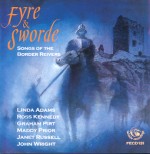 |
Fyre & Sworde - Songs of the Border Reivers (felside recordings 1998). This is a superb collection of 14 songs from the lawless region of the Scottish-English borders. These are bold songs of raids, wars and love sung by some of the giants of the region including Maddy Prior, Ross Kennedy, Linda Adams, Graham Pirt, Janet Russell and John Wright. (Very highly recommended) |
Northumberland Music |
 |
Northumbria is the county that borders on Scotland. The music from this area resembles Scottish music in many regards, but also has a strong independent streak. In particular, this music is characterized by the unique Northumbrian pipes. These are smaller, elbow driven pipes, somewhat like Scottish small pipes or border pipes. They have a particularly sweet, mellow voice, and often are played very quickly. Once nearly extinct, the playing of these pipes has undergone a revival recently in Northumberland. News of this revival has r eached the outside world largely through the touring of Kathryn Tickell, a remarkably accomplished young piper, featured memorably on the cover of the December 1997 issue of Dirty Linen magazine.
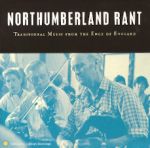 |
Various - Northumberland Rant - Traditional Music from the Edge of England (Smithsonian Folkways Recordings 1999). This magnificent CD would be worth it for the liner notes alone - 32 pages of background text and illustrations of this music from the borderlands south of Scotland. But what great recordings they captured here. 21 tracks including 3 by Billy Pig, another three by Will Taylor, plus Jack Armstrong, The High Level Ranters, and many other great older players representing a broad range of traditional playing mainly on Northumberland pipes and fiddle, plus a set of tunes from Kathryn Tickell representing the new generation. Many of the tracks on this CD were field recordings going back to 1954 not available elsewhere. (Very highly recommended) |
|
 |
Kathryn Tickell - The Gathering (Park Records 1997) Tickell is English, not Scottish, and plays the Northumbrian small pipes rather than Scottish pipes, but if you like any piping music, you have got to hear this album. in the hands of Tickell, they are gaining a rightful place in traditional music and generating much interest. For more information check the web page of the Northumberland Pipers Society. Tickell's 1999 album Debateable Lands is another set of tunes inspired by a stretch of border country four miles wide and 12 miles long between Scotland and England. As always, Tickell's graceful playing of the mellow Northumbrian pipes is masterful, and her fiddling very competent. This all-instrumental album has a surprising mellowness to it, given the lawlessness of the area during much recent history. It is very lyrical, and a bit contemplative, and carries off these feelings with great success. If you are new to Tickell, I would start with The Gathering or The Northumberland Collection, but Debateable Lands is definitely a worthy album. Kathryn Tickell & ensemble mystical (Park Records 2000). Listening to Tickell on the Northumberland pipe is always a joy, no less so here. Her playing sparkles. Nevertheless, this album is much more introspective and sombre than her previous albums. The four songs, sung by Mary Macmaster are particularly dark. The extensive use of cello with Ron Shaw also darkens the flavor of the tunes. The tunes were mainly written by Tickell. (Recommended) |
|
|
Kathryn Tickell & Friends- The Northumberland Collection (1998, Park Records) Master of the Northumberland pipes and great fiddler, Tickell brings along her friends, a great collection of Northumberland singers and instrumentalists on border pipes, melodeon, guitar, harp, etc. Northumberland is the region across the River Tweed, south of Scotland, and the music is distinct from, but clearly related to Scottish music. The songs, in a heavy Northumberland dialect, are a mix of old and new, but only with the excellent liner notes could I tell which is old and which new! (Very highly recommended). |
Return to Celtic Music Home Page
Please send me your comments or suggestions: jim@sfcelticmusic.com